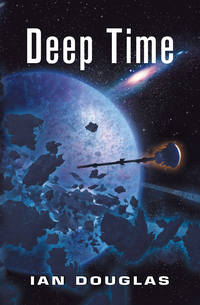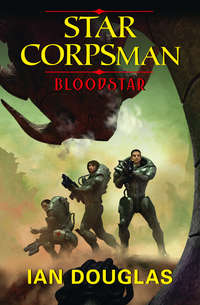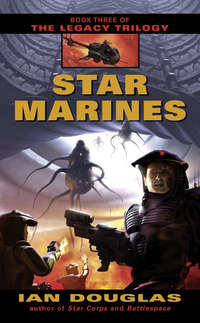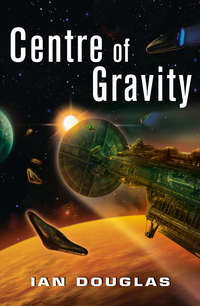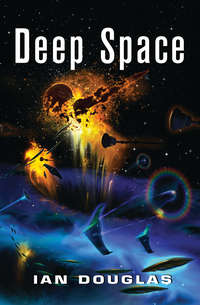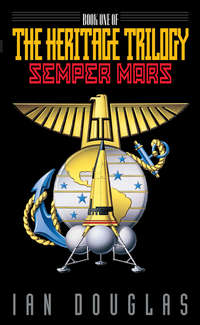
Полная версия
Bright Light
Her orders, the standing orders for the five-ship flotilla here, were simply to patrol the Kapteyn’s Star system and alert Earth if the Rosies showed up again. Judging by what was unfolding out of Heimdall, they’d never left in the first place, and Earth was going to want to know about that.
“Get us back to the others,” she told the helm officer.
“Aye, Captain.”
“Exec? Go to general quarters.”
This was not looking good.
USNA FME Olympia
Rosette
Omega Centauri
1214 hours, GMT
Some 15,800 light years removed from Earth, an AI called Limpy by the humans working with it stared into strangeness as well. Although he did not think in the same way that humans did, and did not make the same value judgments, it knew that something was going on … and that it did not look good.
Omega Centauri was the largest globular star cluster in the Milky Way galaxy—10 million stars with a total mass some 4 million times that of Sol, packed into a sphere 150 light years across. At its gravitational center, deep within that teeming swarm of stars filling an impossibly crowded sky, six black holes, each the size of a world, orbited, in a patently artificial manner—a Klemperer rosette.
Centuries before, Terran astronomers had demonstrated that Omega Centauri was not, in fact, a typical globular cluster, but rather that it was the stripped-down core of a small galaxy that had been sucked in and devoured by the much larger Milky Way more than half a billion years before. Large galaxies, it was known, were cannibals, shredding smaller galaxies and slurping up the remains. Several stars—among them the red dwarf Kapteyn’s Star, only 12.7 light years from Sol, had been proven by their spectral fingerprints to be escaped members of that ancient galaxy.
Much more recently, human warships engaging the so-called Sh’daar Empire had traveled back through time and discovered that galaxy, called the N’gai Cluster by its myriad inhabitants, during an epoch when it was still just above the Milky Way. At the heart of N’gai, they’d found what was almost certainly the precursor of the Rosette—six hyper-giant blue stars serving as a kind of beacon or monument for the Sh’daar.
Here within Omega Centauri, however, those hyperstars had long ago exploded, turning into black holes whirling around a tortured volume of space not much larger than Earth. And there was more. The enigmatic being known as the Consciousness had been busily building … something. Titanic structures apparently constructed of pure light hung suspended around the hexagon of rotating singularities and extended in all directions to impossible infinities.
The monitor Olympia, a high-tech listening post disguised as an innocuous chunk of rock the size of Mt. Everest—crewed by 150 humans and a late-model AI with some very special programming—had slipped into orbit around the Rosette only weeks before. With downloads based on data snatched from the Consciousness at Kapteyn’s Star, Limpy could eavesdrop on the Consciousness by linking in to back channels and sidebands to tap into conversations between a few of the far-flung individual devices making up the whole.
So far, the effort had not been particularly productive. One xenosophontologist had declared that the eavesdropping effort was akin to finding out what a human was thinking by analyzing the waste emissions of a couple of the bacteria in his gut. Limpy felt that the chances of getting something useful were better than that, but he understood the problem. The Consciousness was very, very large and complex, and even the very best human-directed SAIs had little chance of understanding the entity in more than an extremely basic way.
To Limpy, it was a chance worth taking.
Right now, the AI on Olympia was drifting across the face of the Rosette, its orbit taking it cross the opening between the six whirling singularities. In the space at the center, stars were visible … but not the thronging, massed stars of Omega Centauri. Olympia’s bridge crew was looking, quite literally, through a hole punched in spacetime. They were looking into somewhere—and somewhen—else.
Clearly, the Rosette was a stargate of some kind. The high-velocity rotation of those black holes around their common center twisted the normal, sane dimensions of spacetime out of all reason, opening numerous gateways into the unknown. The starscapes glimpsed within that whirling gateway might be other regions of the galaxy, other times, or even other universes entirely.
The being called the Consciousness had come through from one of those elsewheres. The Consciousness, the Rosette entity, the Alien Intelligence … all of those were names for something Humankind had never truly encountered and might never be able to understand.
Limpy was here to try to learn more.
“Hey, Limp?”
“Yes, Captain Mosely?”
“What’s all that stuff over there? Opposite the Rosette opening?”
He knew exactly what Mosely was referring to. He’d been watching the phenomenon grow and develop for several minutes now … a huge cloud of what looked like smoke, white and gray-silver in the massed starlight.
“Unknown, Captain. It appears to be clouds of micromachines similar to those you call fireflies, numbering in the trillions.”
“What are they doing?”
“Coming in this general direction.”
“Shit …”
The Olympia AI continued watching for several moments. “Captain, I would suggest you sound general quarters.”
“I was just arriving at the same conclusion.”
A second later, Olympia’s internal passageways rang with the shrill clanging of the alarm. Not that it much mattered—the swarm was on them before most of the crew was able to take their positions. Yet the lead elements of the cloud swept past the ship at a range of several hundred kilometers, and it soon became clear that the cloud’s target was not the Olympia.
“So where are they going in such a damned hurry?” Mosely wondered aloud, thinking the danger had passed.
And then a shudder ran through the drifting mountain, followed by several savage shocks.
“Limpy!” Mosely called. “We’ve been hit!” The starfield outside began drifting. “We’re rotating!”
“We haven’t been hit, Captain. We have been caught in an extremely powerful gravitational stream.”
“What the hell is a ‘gravitational stream’?”
“A narrow, tubular volume of space has been distorted in such a way as to create rapid movement toward the Rosette. We have been caught by the fringes of the effect and are being swept along.”
“Toward the Rosette …”
“That is correct, Captain. Unless we can break free, we will pass through the central lumen of the hexagon in another forty-three seconds.”
The Olympia possessed gravitational drive engines, but the ship was slow and underpowered for a vessel of its size and mass. Mosely was shouting orders, trying to engage the drive and bring the ship clear, but the AI had already determined that there simply was not enough power for the ship to break free, not in the time remaining.
Olympia’s capture did not appear to be a hostile act; indeed, it seemed to be completely accidental. The column of gravitationally warped space enveloped the vast swarm streaming through space toward the Rosette. It seemed likely that the devices themselves were generating the warp as a means of propulsion, and that their destination was somewhere on the other side of the Rosette gateway through spacetime.
Regardless of the reason, Olympia was being dragged along with it.
With emotionless efficiency, Limpy compressed a complete record of recent events into a laser comm message and fired it into space. There were other vessels drifting in the heart of Omega Centauri that would get the record back to Earth.
Ahead, the blurred ring of distortion created by the rapidly circling singularities expanded, filling the sky. Brilliant hues of light—light trapped within the gravitational anomaly—created a radiant halo effect that resembled a titanic, unblinking eye. At the very center of the distortion, within the eye’s pupil, a starfield had appeared. Limpy did a rapid scan and assessment and discovered that the starfield matched nothing in his own memory.
And then Olympia fell through the eye and vanished from local spacetime.
SupraQuito Space Elevator
In Transit
1635 hours, TFT
Gray was glad that he always traveled light. After his interview in Geneva, he’d been taken to a hotel for an uncomfortable night’s sleep, and then he attended a six-hour briefing covering things of which he was already well aware: the wrecked high-technic civilization at Tabby’s Star, the discovery of the Omega Code, and the fact … no, the presumption that a highly advanced civilization existed at the brilliant blue-white star Deneb some 173 light years from Tabby’s Star.
Because he’d been the one to uncover most of this information, Gray sat bored and cross-armed through most of it. He was able to correct a presenter at one point, however. There was a possible motive for the Denebans to attack the Satori, the civilization at Tabby’s Star. The Satori had encircled their sun with gravitational thrusters and been accelerating their entire civilization, star, Dyson swarm, and all, in the direction of Deneb. Why was still unknown … but the Denebans evidently hadn’t taken kindly to pushy neighbors.
It would be well, he told the large audience gathered in the Ad Astra center’s amphitheater, to keep that in mind when they approached Deneb for the first time.
Later that afternoon, he, Vasilyeva, and a dozen of her xenosoph people had boarded another, considerably larger, grav flier for the very nearly 10,000-kilometer flight to Quito, in the Unión de América del Sur.
From there, a brief tube ride had taken them to the base of the first of Earth’s three space elevators, anchored to a mountaintop perched directly astride Earth’s equator. The group had then boarded a special express skycar for the trip up to SupraQuito.
Express meant an acceleration of one G—which, added to the one G of Earth’s surface gravity, meant that the passengers were under two gravities for the first part of their trip. The magnetic skycar was impeccably appointed, however, with luxurious reclining seats designed to keep the passengers as comfortable as possible despite the sensation of another person sitting on their chests. Decks, bulkheads, and overhead projected views of their surroundings—in particular the gloriously beautiful vista of the cloud-wrapped Earth falling away below them.
Not that any of them had any particular interest in watching the Earth. Gray was focused on his breathing as they shot faster and faster into the sky above Quito, magnetically accelerated along the taut Earth-to-heaven cable.
The sensation of crushing weight lessened bit by bit as the skycar rose higher. Thirty-two minutes after leaving the elevator port, they were traveling at 19.5 kilometers per second and they were at the halfway point, almost 19,000 kilometers above the mountaintop. Acceleration ceased, and the passenger compartment rotated through 180 degrees, until the vast blue-and-white expanse of the Earth below swung around and took up a new position above them. They were now decelerating at one gravity, though it felt like considerably less because the Earth now was working against that acceleration rather than adding to it.
“I thought we would be in zero-G once we were in space!” one of the scientists grumbled. His name was Dr. Liu and Gray had been told he was on loan from the Shanghai Institute of Advanced Technology.
“Only if you’re in orbit,” Gray told him. “If you’re in free fall, you’re basically falling around the Earth … but you’re never outside of the reach of its gravity. This part of the space elevator isn’t in orbit, and if you were to open a hatch and step outside right now you’d fall all the way back down to Ecuador.”
“It’s different up at geosynch,” Vasilyeva added gently. “We’ll be in free fall there.”
Liu grunted, and Gray fell silent, feeling a small disquiet. He would have thought that any scientifically literate person would know that, and not make such a rookie goof.
Expertise in one scientific area, evidently, didn’t qualify the person as an expert in others. Space, however, was a place where ignorance could get you killed.
He wondered how savvy the rest of this crowd was when it came to basic orbital mechanics.
One hour and five minutes after leaving Earth, the skycar decelerated into SupraQuito Synchorbital Station, and a five-minute tube run brought them to the yards.
Gray sat in the tube capsule looking up through the overhead transparency at a labyrinth of struts and railguides, and orbital structures, gantries, and dockyard facilities slowly moving past against the backdrop of space. Ahead, docked within her gantry, the USNA CVL Republic looked just as Gray remembered her.
He was coming back on board her, he knew, with decidedly mixed feelings. He was eager to get back on board a ship—any ship—once again, and the sooner the better. There was little enough on Earth to hold him there now, he knew. Each time he returned to explore his roots within Manhatt, he found more and more change, less and less a sense of home or belonging.
But his interview with the Pan-Euros had shaken him. They seemed to have a nearly apocalyptic prescience about this mission, a feeling that failure might well spell disaster for all of Humankind.
And knowing that so much was riding on his decisions, his experience, filled Gray with a deep and angry foreboding.
Chapter Three
1 February 2426
Lieutenant Gregory
SupraQuito Synchorbital
1218 hours, TFT
The offices of Paradise, Inc. were located in a rotating wheel attached to the synchorbital complex just outside of the naval yards. Gregory had checked himself off of the Republic and taken a mag-tube to the office structure’s microgravity hub, from which he caught an elevator “down” to the wheel’s one-G rim. The reception office was luxuriously appointed, with viewalls set to peaceful mood-abstract animations, and with hauntingly ethereal music piped through from hidden speakers.
An android robot took Gregory’s personal stats, and he was ushered through to an inner space where he met Kazuko Marukawa, seemingly adrift in swirls of colored light. “So, Lieutenant Gregory,” she said with a dazzling smile as he took a chair opposite her desk. “What brings you to Paradise?”
“I’ve … lost someone,” he told her. “Someone very important to me. I’ve been wondering about the eschatoverse.”
“An eschatoverse,” she said, gently correcting him. “We build one exactly to your specifications. We have, quite literally, billions of available models to choose from.”
The thought of his own private heaven felt uncomfortably claustrophobic. “Isn’t that … I don’t know … kind of lonely? A virtual universe just for me and whoever I bring along?”
“Not at all. Think of your ’verse as a bubble … but one that is constantly merging and interacting with others, with many others. You would have access to the entire virtual multiverse of billions of distinct realities. We offer ready-made realities representing the afterlives of hundreds of distinct religions and belief sets. We offer realities tailor-made to your specifications, where you can fly with a thought, enjoy superhuman powers, anything that is possible for you to imagine … and much, much more! Your new reality, I assure you, will be far, far more intricate, more interesting, and more fulfilling than the so-called real world is for you now!”
Gregory knew about virtual uploads. It was the same trick, more or less, used by the Baondyeddi and other technically advanced alien species to vanish down a virtual rabbit hole out at Heimdall. Human technology had been moving toward this goal for centuries, but virtual uploads had become practical only within the past few decades and on a much smaller scale.
But that scale was growing fast.
“So … I know it’s possible to make a copy of the human brain,” he told her. “And that copy can be uploaded into a computer that’s running a virtual simulation of a world … of an entire universe, even. But if I uploaded myself into one of your bubbles … would that really be me? I mean … even a perfect copy of my mental state is still a copy. What happens to the … uh … real me?”
She laughed and shook her head. “Lieutenant, you would be amazed at how many times we hear that exact question!”
“You would be amazed, Ms. Marukawa, how much I would hate to wake up and find that I was the version of myself that didn’t get uploaded.”
“Do you believe in the soul, Lieutenant?”
“I’m … not sure. I don’t think so …”
“Well, let’s concentrate on your conscious awareness, your sense of self. You have one, I assume?”
He was becoming annoyed with her perky assertiveness. “Of course I do.”
“Your brain is a network of interconnecting neurons … about one hundred billion of them linked with one another in complex structures through up to eleven topological dimensions, yes?”
“Uh … yeah …”
“The interactions of all of those neurons give rise to memory, to decisions, to what we call consciousness.”
He nodded.
“Okay. If I were to take just one of your neurons and replace it with a microscopic nanocomputer, maintaining all of those synaptic linkages … would you notice the difference?”
“Probably not.”
“Would you still be you?”
“Yes …” He saw where this was going. He’d heard the argument before, but still wasn’t sure he bought it.
“And if I replaced ten of your neurons … ten out of one hundred billion. Would you still be you?”
“I know what you’re saying, Ms. Marukawa. If you could magically replace my neurons one at a time, eventually, my brain would be all machine instead of organic jelly and my mind could be transferred to a robot body … or uploaded to a supercomputer. If all of the connections are the same, I shouldn’t notice any difference.”
“Your consciousness would be preserved, identical to what you think of as you in every way.”
“I understand all of that. What I don’t understand is how you can move my conscious mind from here”—he tapped his forehead—“into a machine. That’s different than just swapping out parts.”
“All I can tell you, Lieutenant, is that we’ve had no complaints.”
“What happens to the organic body once the consciousness leaves it?” He realized as soon as the words were out that it was a damned silly question.
“The organic brain is destroyed in the scanning process, Lieutenant. The body is disposed of in a manner determined by the client. We offer a number of mortuary—”
He held up his hand. “I don’t think I want to hear that part. Listen … about my friend …”
“This was someone you loved?” He nodded. “A woman?”
“Her name was Megan.”
“Do you have a recording? Or is she already in an eschatoverse?”
He sighed. “I have her avatar.”
“Ah.” Marukawa’s face fell. “We can offer you an extremely lifelike simulation, of course. A dedicated AI recreates her appearance, her emotions, her thoughts and mannerisms based on the available data. It’s not—”
“It’s not really her. I know.”
Gregory leaned back in the chair, fingers drumming on an armrest. The flow of soft light and random shapes around him was distracting, even hypnotic. He needed to think this through.
Meg’s avatar had been the electronic version of her she used to communicate with others virtually, a kind of personal assistant and secretary that could seamlessly stand in for her electronically. He thought of it as a kind of sketch of the real person, though that hadn’t stopped him from having long conversations with it since Meg’s death. Everyone had one—everyone except Prims, of course, or religious fanatics who didn’t believe in using such things.
Gregory had been considering suicide for some time, now, a simple and painless way out of the pain of a world without Meg. Paradise, Inc. offered him an option: even if the mind—not the real Don Gregory—was transferred to a simulated universe, the Gregory left behind would end, and that in and of itself would be a form of heaven.
And if this company was able to transfer the conscious mind, the self, the sense of ego and being and self-awareness that was Don Gregory, he would wake up in a better, richer, more vibrant universe with at least the illusion of Megan with him again.
Maybe in time he could forget that she was an illusion wrapped around a packet of AI software.
Marukawa seemed to be reading his thoughts. “We can edit your memories during processing, Lieutenant,” she told him. “You could be unaware that she was a copy. If you wished, you would be unaware that you were living in a simulated universe.”
He chuckled. “I’ve heard it suggested that we’re already in such a simulation. And how would we know?”
“An untestable hypothesis,” she said, “but a fascinating one.”
“If we are living in a simulation, someone up there programmed a piss-poor reality for us.”
“And that, Lieutenant,” she said cheerfully, “is why Paradise, Inc. is here. Now … you’re currently on active duty?”
“I am. Two more years before I can resign my commission.”
“That is not a problem, Lieutenant. We can make a reservation for you, and even begin designing your ideal universe for you before you process.”
“I’ll need to think about it, ma’am,” he told her. He stood up. “One more question?”
“Of course.”
“How do I pay for all this if I’m dead?”
“You turn over your personal credit when you come for processing, Lieutenant, with a ten-thousand-credit minimum. The more credit you transfer, the larger the field of available universes open to you once you cross over. The cost is applied to the ongoing maintenance of your eschatoverse, to administrative overhead—”
“Including your own salary, I’m sure.” He grinned at her. “Thank you, Ms. Marukawa. You’ve been most helpful.”
“We look forward to your new life with us, Lieutenant.”
Gregory left the office and made his way cross-complex to the Free Fall, a watering hole popular with naval officers enjoying some downtime “ashore.” His conversation with Marukawa had brought up a couple of unpleasant points.
First and foremost, of course, was the inescapable fact that Meg was dead, that if he shared an artificial reality with her, it would be with an electronic illusion, not with the real person. Okay … he could edit that part out of his memory. But still, the idea was … unpleasant.
There was also the very real question of eternity. Nothing lasts forever, and that certainly included the computers and AI networks girdling Earth in the various synchorbitals or buried underground on the moon and elsewhere. Granted, someday all of those networks might be subsumed into a larger, more powerful, more advanced electronic infrastructure. He could imagine Humankind building its own Dyson swarm, like the one they’d discovered out at Tabby’s Star … or even a Kardashev-3 galactic Dyson sphere, like the one they’d glimpsed a few million years in the future. If that happened, Paradise, Inc.’s virtual multiverse would likely get picked up and passed along.
But Gregory had seen what happened when the Rosette entity had descended on Heimdall, just twelve light years from Sol. Uploaded minds occupying artificial realities there had been … eaten. Were they still alive—assuming of course that digital minds in a virtual reality could be thought of as “alive”?




